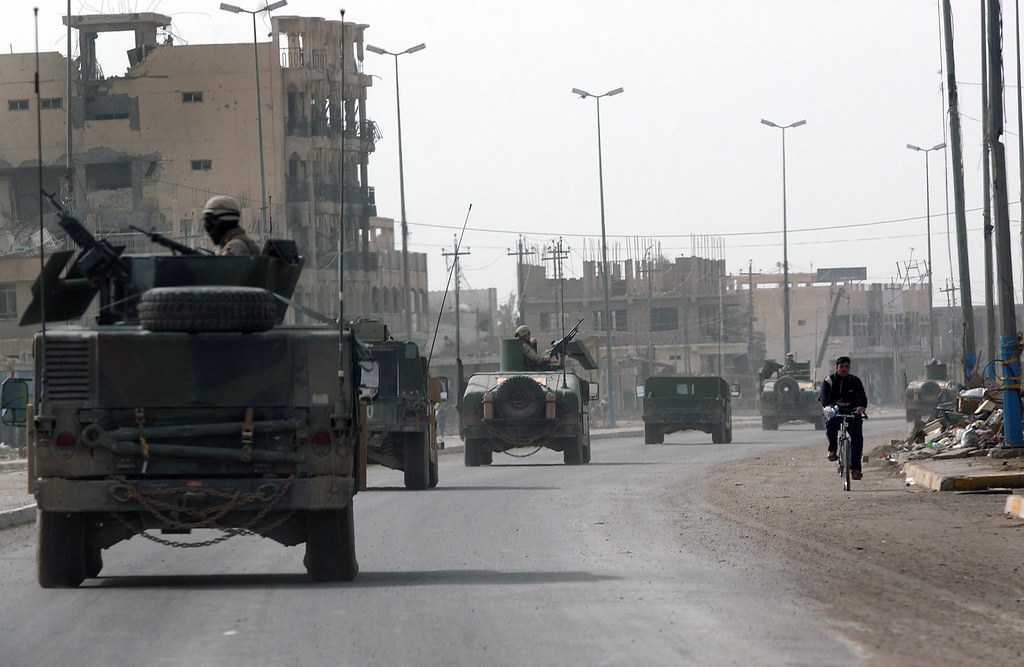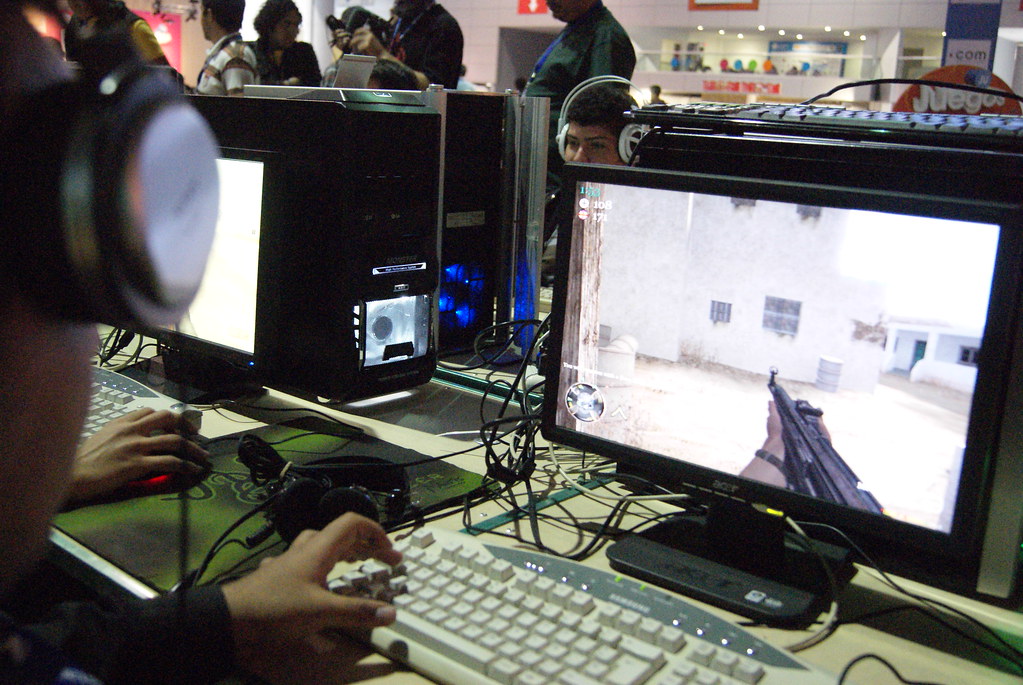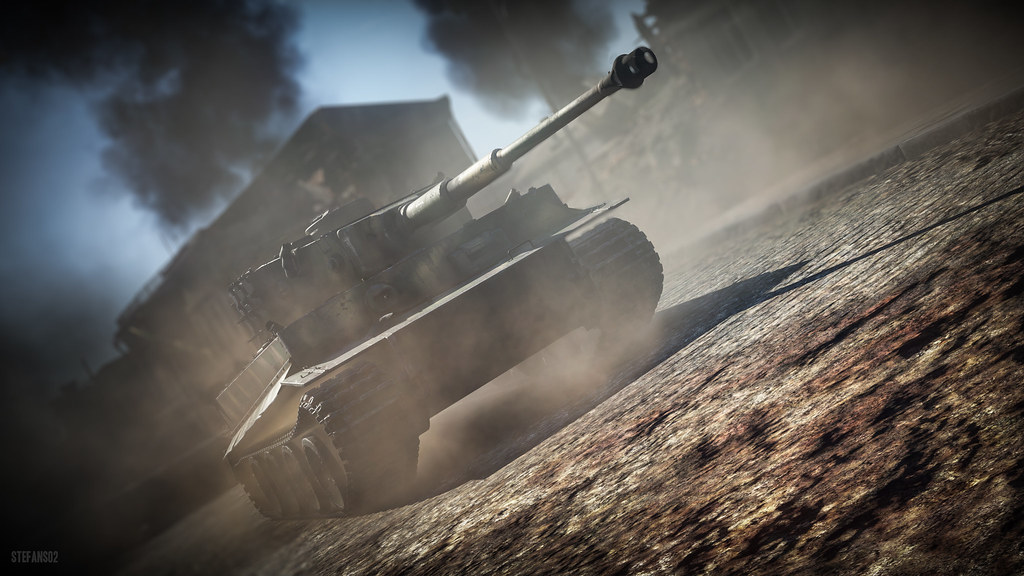By Georgia Mealings, Research Assistant for ‘Warnings from the Archive’
When studios market wargames, they emphasise the authenticity of experience. The latest videogame technology is so immersive that the graphics, the sound design, the game mechanics, and the worldbuilding all work together to persuade you that are really there, on a battlefield or controlling an aircraft. The studios’ intent is to curate a realistic sensory experience that can offer a taste of the ‘thrill’ of war, without any of the risk.
In March 2021, Victura, a videogame studio, promised the most realistic game yet when it released the first trailer for Six Days in Fallujah, a project that has been in development limbo for over a decade due to its controversial recreation of one of the most famous battles of the Iraq War. The game is a classic first-person shooter, in the style of popular franchises Call of Duty and Battlefield, yet this is the first time the Iraq War has explicitly been used as a setting in a game.
With the memory of the conflict still raw for those who experienced it first-hand or lost loved ones, many have criticised the developers on ethical grounds. It was dropped by its original publisher in 2009 after condemnation from veterans and anti-war groups such as Stop the War Coalition. Another wave of backlash has been sparked by its revival, with Ahmed Twaij, in Foreign Policy, commenting that “preying on these real-life tragedies for entertainment is morally reprehensible… The game should never be released.” Focusing on Fallujah is particularly provocative because the US was accused of various war crimes during the battle, notably for its use of white phosphorus against insurgents and innocent civilians.
Thus when Victura put out a statement claiming they were “not trying to make a political commentary,” they were quickly forced to backtrack. The studio has since admitted that the “events recreated in Six Days in Fallujah are inseparable from politics” and have made efforts to include historical reflections on the 2004 battle. The developers say that gameplay will be interspersed with documentary-style interviews with soldiers and civilians, and that every effort has been made to ensure accuracy and a balance of perspectives – although only 26 Iraqi citizens have been consulted.

The controversy feeds into a broader, long-running debate about the portrayal of war in the industry. Whilst the moral panic that modern videogames promote violence in young people has repeatedly been found false, it is hard to dispute the argument that they have often glamorised war and militarism. Many franchises offer a low-stakes, sanitised version of conflict in which the true psychological and humanitarian horror of war is rarely present. Additionally, whilst these games often claim to be entirely fictional, they cannot be separated from their geopolitical context; Call of Duty: Modern Warfare (2019) courted controversy for its revisionist take on actual events. One level of the campaign sees our American heroes defending against the Russian antagonists who have launched an assault on an area known as the ‘Highway of Death.’ But in fact, the ‘Highway of Death’ was the real-life site of a devastating American attack during the 1991 Gulf War. The game has also been criticised for its use of white phosphorus strikes as a reward available to players. Former U.S. Marine John Phipps remarked “I find Modern Warfare‘s use as a killstreak reward a nearsighted glorification of what myself and others consider to be a violation of the laws of armed conflict. Contrary to their overall goals towards realism in its campaign, the multiplayer mode in CoD doesn’t depict the effect White Phosphorus (WP) has on the human body in any kind of realistic way.”
It is worth noting that what Phipps takes issue with is not the inclusion of white phosphorus but its portrayal: “I don’t object to things like WP being examined in games, so long as we depict them as they truly are.” This is what a lot of commentators misunderstand about videogames when they critique them. As Gene Park has talked about in the Washington Post, videogames are not a monolith but “a living culture in which about 2 billion humans on Earth participate.” The problem is not with the medium, which at its essence just another form of storytelling, but with the mass culture of war in the West.

Part of the issue is that the videogame industry has long been intertwined with the military-industrial complex, which has consistently underplayed the devastating nature of the American wars in the Middle East and venerated the idea of dying for one’s country. In fact, Peter Tamte, the architect of Six Days in Fallujah, was inspired by his experience developing videogame training tools for the United States Marine Corps. In the early 2000s the game America’s Army, another first-person shooter, was used explicitly as a recruitment tool by the US military. A lot of scholarly attention has been directed towards how the military mobilises mass media to engender support for war. Marcus Schulzke warns against overemphasising a causal link between the videogame industry and recruitment without solid empirical evidence, but it is easy to see how games have contributed to a wider culture in which military service is valorised. This is the same culture that has resulted in Hollywood films such as American Sniper (2014), which lionises the Iraqi kill-count of US Navy SEAL, Chris Kyle. Modern media reflects the patriotic, militarised culture of the United States in the post-9/11 era, failing to critically engage with the neo-imperialist aspects of American foreign policy and reducing modern conflict to ‘good guys versus bad guys’ shoot-outs.
There are games which have pushed the boundaries of the genre, most notably Spec Ops: The Line. Although it was released in 2012, the game is still popular for its gut-wrenching depiction of the reality of war. In Spec Ops, the player is forced to confront that often there only terrible choices in war, and one must face up to the consequences of their actions. In one instance, the player is immersed in the grisly aftermath of a white phosphorus strike. It is a war game, but it is also a psychological horror and a lesson in the twisted morality of conflict, complicating traditional videogames’ narratives of war. In a similar rejection of mainstream videogames, This War of Mine (2014), a critically-acclaimed indie strategy game, the player takes on the role of a civilian trying to survive in a besieged city. The game was directly inspired by the atrocities and poor conditions suffered in the 1992-96 Siege of Sarajevo during the Bosnian War. Neither of these games are as visually or technologically advanced as Call of Duty or Six Days in Fallujah, but they have a powerful sense of realism. They use the medium to challenge players’ ideas of war and ask uncomfortable questions about the cost of conflict.

The depiction of war in videogames is not as clear-cut as some would suggest. Whilst it is easy for studios to monetise a whitewashed version of history or a glamorised view of military service, the immersive narrative experience offered by videogames can also offer a unique opportunity to confront how we view conflict. However, the prevailing culture of war media means that games like Spec Ops remain an exception. With the reluctance of the team behind Six Days in Fallujah to admit to the highly political nature of their topic, it is seeming unlikely that they will be brave enough to break away from the mainstream mould.
Further Reading
Aaron Drummond, James D Sauer. and Christopher J. Ferguson, ‘Do longitudinal studies support long-term relationships between aggressive game play and youth aggressive behaviour? A meta-analytic examination’, Royal Society Open Science, 7 (2020), http://dx.doi.org/10.1098/rsos.200373
Ahmed Twaij, ‘For Iraqis, War Is Not a Game’, Foreign Policy, 30 May 2021, https://foreignpolicy.com/2021/05/30/united-states-iraq-war-six-days-in-fallujah-video-game/
Gene Park, ‘Video games deserve better than blanket, parachute coverage from reporters who don’t get it’, Washington Post, 27 June 2021, https://www.washingtonpost.com/video-games/2021/01/27/video-games-screen-time-new-york-times/
Hamza Shaban, ‘Playing War: How the Military Uses Video Games,’ Atlantic, 10 October 2013, https://www.theatlantic.com/technology/archive/2013/10/playing-war-how-the-military-uses-video-games/280486/?single_page=true
Marcus Schulzke, ‘Rethinking Military Gaming: America’s Army and Its Critics’, Games and Culture 8, 2 (March 2013), 59-76, https://doi.org/10.1177/1555412013478686
Quil Lawrence, ‘Is It OK To Commemorate One Of Iraq’s Bloodiest Battles In A Video Game?’, NPR, 23 June 2021, https://www.npr.org/2021/06/23/1008841328/is-it-ok-to-commemorate-one-of-iraqs-bloodiest-battles-in-a-videogame
SkillUp, CoD Modern Warfare Pulls Every Punch That Spec Ops: The Line Didn’t, video, YouTube, 11 November 2019, https://www.youtube.com/watch?v=SvRFTcPSqzY&ab_channel=SkillUp